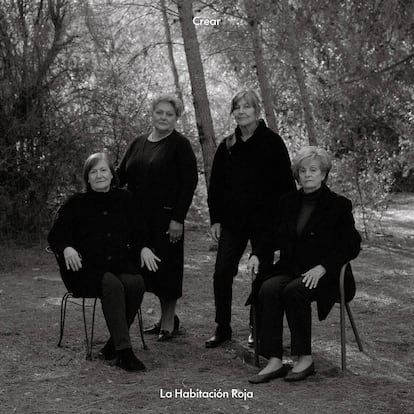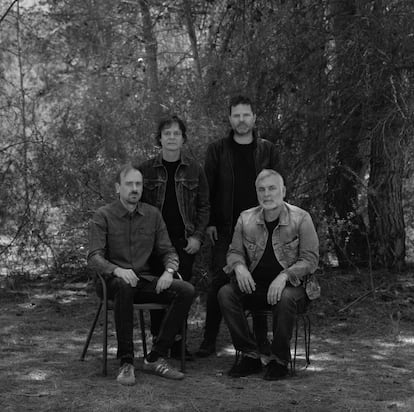The Valencian group La Cámara Roja has just published their 14th album, Create. They have a total of 30 years of career. The cover shows four women: Lola, Mari, Isa and Maruja. They are all over 70 years old. Two sitting at the ends and two standing in the center. A black and white image taken in a forest. They are the mothers of the four members of the band. The group explains this decision: “We want to claim the experience, the maturity, the trajectory, the determination to move your loved ones forward. The unconditional love and support that our mothers exude, in contrast to the superficiality and excessive worship of image and youth that bombards us and that always leaves aside the women who have not only given us life, but also who “They have preserved and encouraged it since they gave birth to us.” Nice preamble to start this story.
In reality, it works as a metaphor for The Red Room’s career: love, perseverance, patience, humility. “Life, music and work are intrinsically linked and we see that commitment in the figure of our mothers, who have always cared for and supported us,” expresses the group. But wait: have they always supported you? “I would have liked my son to have dedicated himself to something else, why am I going to lie to you. Now I see that it is beautiful. But you know what it has cost them to succeed a little…”, explains mother Lola (79 years old), whose son is the singer, guitarist and main composer of the group, Jorge Martí (52 years old), with frankness. Indeed, Lola is right: it has cost them a lot. The Red Room emerged in the mid-nineties, with the first generation of the indie Spanish. Few remain from that time, just The Planets and them. “I don’t understand why they haven’t succeeded much more, because they have great songs. But, well, even if they don’t play in halls, they have a good handful of followers and they fill rooms,” says Mari (72 years old), mother of the bassist, Marc Greenwood (42 years old).

In the last three decades the quartet has not stopped playing for even a year, almost always in halls with capacity for 1,000 people (when they perform in Madrid, Barcelona or Valencia) or 500, when they travel to other cities. “We are rock fans. Well, that was when you could live on a thousand euros, because now… Our position is in the middle class. Only for about 10 years have we had a half-decent salary as musicians,” says Martí. Pau Roca (48 years old), the guitarist, adds: “We don’t take drugs and we have cheap cultural vices, so it gives us enough to live on.”
Lola, Jorge’s mother, is worried because in three days she will have surgery on tendons that prevent her from walking well. Also for his son, who has been living in Norway for decades with his partner and two daughters, when the activity of The Red Room (performances, interviews, rehearsals, administration) takes place in Spain. “Jorge leads a life that makes us suffer… So much traveling… If he lived here… Furthermore, we (she and her husband) have grown older and we can no longer go and lend a hand to Norway,” Lola says with some sadness.
Lola’s home in L’Eliana (Valencia) It functions as the group’s headquarters. “My house is always full of junk, guitars and packages with records. And they have the van here. Jorge always calls me: ‘Mom, I don’t know what’s coming; Mom, I don’t know how many will arrive,” he says, laughing. Lola meets Maruja (78 years old), mother of the drummer, José Marco (52 years old): they both live in L’Eliana. But they had not agreed with the other two mothers. They did it in the photo shoot for the cover of Create. “It was fun, because we had never been together, but we were united by our children’s 30-year history. We made jokes, which is the best way to break the ice. The general comment between us was that you can’t say no to a son: he convinces you of everything, even appearing on the cover of an album,” says Isa (72 years old), mother of the guitarist, Pau Roca.

The photos were taken in the La Vallesa forest, in the Turia Natural Park. A little further down, near the river, the unstoppable passage of the dana has caused significant damage. Roca, the guitarist, served as photographer with Tana Capo, his partner. “They were constantly making jokes, so it wasn’t easy to go from laughing to a more serious, classic pose, which was what we were looking for. I think there is an image that transmits honesty, as they are,” says Roca. The mothers said while posing: “We were so pretty when we were young and you take us out now.” Roca disagrees: “I think they are beautiful now.” Mari remembers the day her son, Mark Greenwood, joined the group. “He was about 17 years old and I took him by car to take the test to enter The Red Room. We went with great fear to the meeting in a shopping center called Nuevo Centro, in Valencia. He got into Jorge’s (Martí) car and they left. I stayed there, worried. But then I met the rest of the group and they are very simple people with a great passion for music.”
Maruja, the drummer’s mother, intervenes: “We had a restaurant and we wanted him to take up the business or study business, but it couldn’t be, what are we going to do?” And he adds: “I told him ‘study, José’, but he looked out the window of his room and he was there, with the music, moving his head. Now, whenever they go out to a performance I pray: ‘Oh, Lord, don’t let anything happen to them.’ “They travel a lot…” Isa summarizes and reaches a conclusion: “I tell Pau: what a merit you have had to survive in a profession, music, that is not enough to survive.” The term comes up in the conversation indie. Much literature has been devoted to trying to define what it is. And here is Isa, who hits the nail on the head with astonishing simplicity: “For me indie It means that they are not in the big circuits and that no one gives them guidelines.”
Many nights, when she goes to bed, Lola listens to the nightly sports program on Cadena SER, The spar. She is interested in football (her husband played for Valencia in the 1950s and became a fan), but above all she likes something else: “They usually play music when they change from one news item to another. And has The Red Room ever been played. I hear my son’s voice in the dark and I get emotional. “Those songs make me cry.”
By the way, Lola’s tendon surgery was a success.
